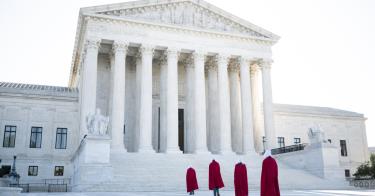If confirmed, Judge Amy Coney Barrett will be the fifth female Supreme Court justice—but don’t look for feminists to celebrate her.
“Amy Coney Barrett is a Grave Threat to Women’s Rights,” was the headline of a Ms. magazine piece. “Amy Coney Barrett is not a feminist,” tweeted Imani Gandy, a senior editor at Rewire News Group, adding, “She’s a handmaiden of patriarchy and an insult to the memory of RBG.”
In New York magazine, Sarah Jones went further, painting Barrett as an outright enemy of feminism: “Barrett is the beneficiary of decades of right-wing activism, much of it carried out by women who not only rejected feminism but sought actively to bring it down low.”
As a conservative woman, I’m disappointed, but not surprised, to see this mean girl rhetoric against Barrett.
Feminist can have kids, be Catholic, oppose abortion
That’s because Barrett is living proof that you can be a feminist—and be a Catholic, have a bunch of kids, and be opposed to abortion personally.
And that’s exactly the narrative liberal feminists have tried to quash for decades.
Too often, women’s rights have been discussed in a way that assumes that all women favor abortion, that all women favor women holding leadership roles in religious sects, and that all women skew liberal on a host of social and economic issues.
Moreover, they insist that if you don’t agree with some or all of this, that’s because you’ve been brainwashed by the patriarchy, delusionally thinking your happiness rests in being barefoot and pregnant in the kitchen.
Now Barrett is showing just how false that is.
Barrett is a mom of seven, a practicing Catholic and a razor-sharp judge and law professor. Not only is she not subsuming her career to bolster her husband’s, she has relied on his help to achieve her own dreams.
“We are totally a team and we share the responsibility,” she told Heritage Foundation’s "SCOTUS 101" podcast this year about raising their large family, adding, “There’s obviously a lot to do, but in no sense do I bear the lion’s share of it.”
And clearly she doesn’t see any contradiction between her own successful career and her Catholic faith. Nor should she. While the Catholic Church is too often dismissed as a woman-hating religion dominated by old men, the reality is far different. True, women can’t be priests—or bishops or popes. But that hardly means Catholic women are living out some dystopian "Handmaid’s Tale" scenario.
Go to virtually any Catholic church and you’ll find statues and images of Mary, the mother of God—the most respected human being in Catholicism, outside of Jesus Christ. And spend just a few minutes looking at the long list of Catholic saints—people believed to have led exemplary lives and now in Heaven—you’ll realize that strong women are well represented. There’s St. Catherine of Siena, who told a pope what to do; St. Joan of Arc, who led troops during the Middle Ages; and in more recent times, St. Gianna Beretta Molla, a doctor and mom.
Before women got the right to vote in the United States in 1920, Sisters Elizabeth Ann Seton and Katherine Drexel founded American schools. Mother Teresa, who was canonized in 2016, not only founded homes across the world to care for the poor but also spoke to the United Nations.
And the ban on women priests? Well, that has to do with the Catholic understanding of the role of priests and the differences between the sexes, not because women are considered second-class citizens. Think about it this way: Are there men marching in protest because they can’t give birth?
The false dichotomy of feminists
On abortion, Barrett's conviction is that “life begins at conception,” according to a 2013 Notre Dame Magazine article. But Barrett also has been clear that she sees a judge’s role being to uphold the law, not legislate from the bench. “Judges are not policymakers, and they must be resolute in setting aside any policy views they might hold,” Barrett said Saturday at the White House.
Furthermore, Barrett’s personal belief on abortion is hardly extreme: 41% of women are pro-life, according to a June Gallup poll. Activists may try to demand that “women’s rights” include abortion on demand through all nine months of pregnancy, but an awful lot of women seem to think that unborn girls have their own right to life that we should respect.
Like many conservative women, I’ve struggled with whether I consider myself a feminist. Too often, that label seems to denote assent to a host of beliefs I don’t share, instead of celebrating that women have the same rights as men, and the opportunity to pursue careers of our own choosing. Too frequently, feminism seems like a rigid box and an ideology that fails to acknowledge that women should be able to freely choose a variety of paths—whether it’s being a stay-at-home mom or a CEO, being an atheist or a devout person of faith, pursuing STEM studies or studying ballet.
But if she becomes our next Supreme Court justice, Amy Coney Barrett will demonstrate that liberal activists have too long perpetuated a false dichotomy: that either you must be aligned with radical leftist beliefs, or be subject to the patriarchy.
Neither is true for Barrett, and I hope, just as Ruth Bader Ginsburg was, she’ll be an inspiration to a generation of girls finding their own path. Maybe someday we’ll even dub her the notorious ACB.
This piece originally appeared in USA Today



